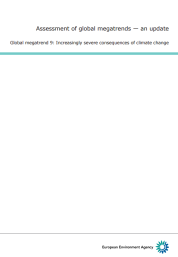
Global megatrend update: Increasingly severe consequences of climate change

Authors’ abstract
In the past 150 years, the atmosphere and the oceans have warmed, snow and ice cover has decreased, sea levels have risen and many extreme weather and climate events have become more frequent. This warming of the global climate is unprecedented over millennia.
The global mean temperature has increased by 0.85 °C since reliable measurements began in 1880 and is projected to increase further by the end of the 21st century – by between 1.0 °C, assuming strong emissions abatement, and 3.7 °C, assuming high emissions. This warming is expected to be accompanied by a global mean sea-level rise of up to 1 m, an increase of up to 2 °C in global upper-ocean temperature, a reduction of glaciers, ice sheets and sea ice, and an increased frequency of extreme weather events, such as droughts and floods, in many regions of the world.
Increasingly severe impacts of climate change are anticipated for the Earth’s natural ecosystems, including substantial losses of biodiversity and increased rates of extinction. Of particular concern are such ecosystems as coral reefs, the Amazon forest and the boreal-tundra Arctic. Furthermore, climate change is likely to slow economic growth, erode global food security, increase global inequalities and adversely affect human health. These societal impacts are anticipated to be most severe in low-income countries and low-lying coastal areas.
Projected impacts directly affecting Europe include increased frequency of drought and water restrictions, increased damage due to flooding and increased impacts on human health from extreme temperatures.
- Issues:
- Climate Change, Natural Resources
- Region:
- Global
- Year Published:
- 2014
- Authors:
- Tobias Lung, Hans-Martin Füssel
- Institution:
- European Environment Agency (EEA)

